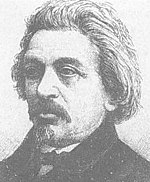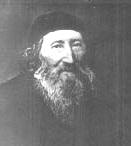


Proto-Zionism (or Forerunner of Zionism; Hebrew: מְבַשְרֵי הציונות, pronounced: Mevasrei ha-Tzionut) is a concept in historiography describing Jewish thinkers active during the second half of the 19th century who were deeply affected by the idea of modern nationalism spreading in Europe at that time. They sought to establish a Jewish homeland in the Land of Israel. The central activity of these men took place between the years 1860 to 1874, before the establishment of practical Zionism (1881) and political Zionism (1896). It is for this reason that they are called precursors of Zionism, or proto-Zionists.
While the 17th century raised the overall idea, among Jews and non-Jews, of "restoring the Jews to Israel naturally by settlement and political action,"[1] the ultimate goal was not yet clearly defined. These ideas did not unite people to action and relied on the national project and the State (the Jewish nation).[2]
This group of men considered to be proto-Zionists includes Rabbi Judah Bibas (1789–1852), Rabbi Judah Alkalai (1798–1878), Rabbi Zvi Hirsch Kalischer (1795–1874), philosopher Moses Hess (1812–1875) and Sir Moses Haim Montefiore (1784–1885).